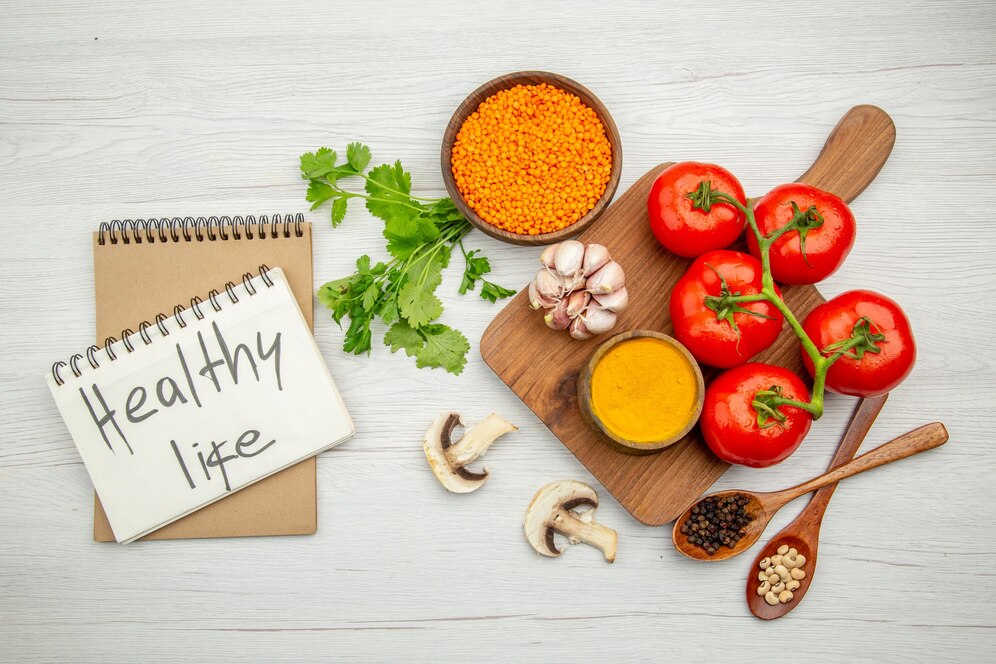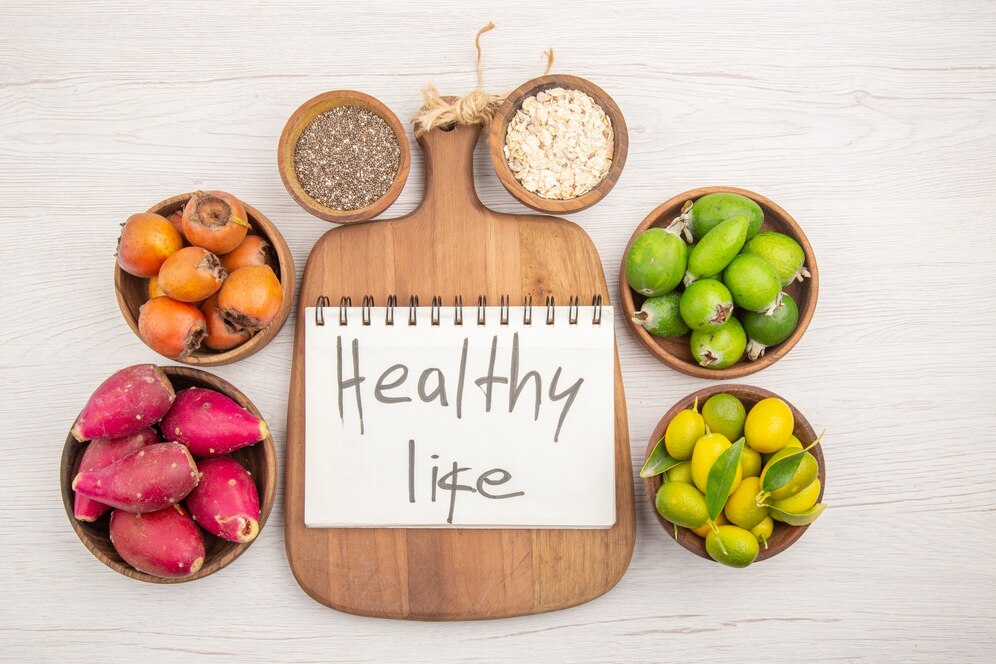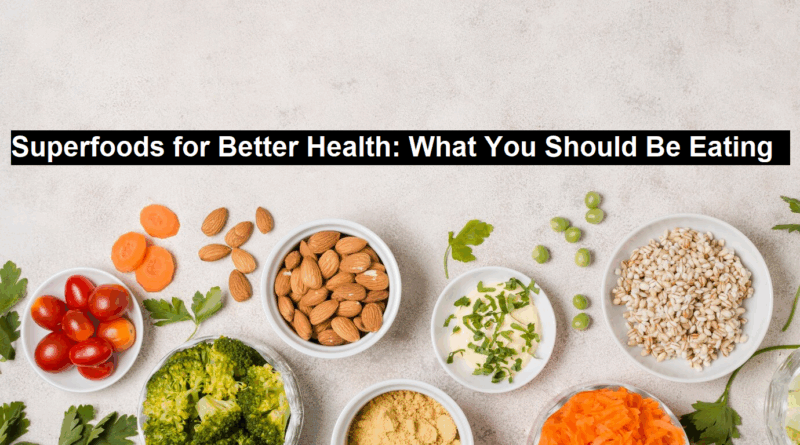Superfoods for Better Health: What You Should Be Eating
Good health has become a top priority. There are always people looking for ways to improve their diet, increase their energy levels, and prevent diseases. Superfoods are one of the best ways to achieve these goals. These are nutrient-rich foods that are superfood high. For example, they improve heart health or brain function. With so many options out there, how should we be eating? Let’s talk about the best superfoods you should add to your diet in the process of improving your health.
What Are Superfoods?
Natural foods that are superfoods contain a high concentration of vitamins, minerals, antioxidants, and other essential nutrients. These types of foods help to reduce inflammation, combat oxidative stress, and support whole-body health in general. In theory, there is no official scientific classification for superfoods, but many health experts agree that there are foods that stand out because of their super-nutritional profile.
Top Superfoods for Better Health
On the list below are the most superfoods you need to eat for good health:

1. Berries
Blueberries, strawberries, raspberries, and blackberries are loaded with antioxidants, vitamins, and fiber. They are thought to help battle free radicals, which can dribble their damage to cells and contribute to the process of aging and illnesses such as cancer. Consuming berries regularly can help in maintaining sound heart health, assist in brain function, and give relief to digestive problems.
Read: Turning Your Outdoor Space into an Exploration Zone for Children
2. Leafy Greens
The most nutrient-dense foods on the planet are leafy greens such as spinach, kale, Swiss chard, and collard greens. They are full of vitamins A, C, K and folates, and minerals such as iron and calcium. These greens offer eye health, help strengthen bones, and reduce the risk of chronic illnesses. You can incorporate leafy greens in various recipes. Taking help with food mobile apps can also bring you leafy green recipe ideas and kitchen hacks.
3. Nuts and Seeds
Full of healthy fats, protein, fiber, and essential vitamins, almonds, walnuts, chia seeds, flaxseeds, and hemp seeds are all great sources for phytofats and, therefore, employ them in this specific case. Bad cholesterol is reduced, brain function is improved, and heart health is supported. Good sources of Omega 3 fatty acids are also chia and flaxseeds just as they are essential for the health of our brain and heart.
4. Fatty Fish
Obtaining omega-3 fatty acids from salmon, mackerel, sardines, and trout can reduce inflammation and lower the risk of heart disease. These fish are also high-quality sources of high-quality protein and vitamin D, which is essential for bone health and immune support.
5. Avocados

Rich in heart-healthy monounsaturated fats, fiber, and potassium, avocados are a good choice to make. They help reduce the level of bad cholesterol, maintain brain function and glow your skin. Creamy in texture and great versatility as an addition to salads, sandwiches, or smoothies, the sprouts are an easy food to provide.
6. Turmeric
A powerful anti-inflammatory substance is contained in turmeric, in the form of curcumin. Curcumin has been studied to reduce the risk of chronic diseases like arthritis, Alzheimer’s, and heart disease. The curcumin absorption is increased if you pair turmeric with black pepper.
7. Garlic
It is noted that garlic is good for reducing blood pressure, lowering cholesterol levels, and improving immunity. It is rich in allicin, a sulfur compound that provides it with many health benefits. Garlic is known to be good for your heart as well as your immune system.
8. Legumes
Plant-based protein and high-fibre beans, lentils, and chickpeas. They assist in fixing blood sugar levels, dealing with digestive health, and weight management. Folate is also important for cell growth and development, and legumes are also a great source of folate.
9. Green Tea
Green tea is rich in antioxidants found in catechins that help fight inflammation and protect cells from damage. Reports have connected it with improving brain function, weight loss, and a lower chance of heart disease. Regular drinking of green tea will be useful to improve metabolism and general health.
10. Dark Chocolate
Rich in antioxidants and flavonoids, dark chocolate with high cocoa (70% or more content) is considered dark chocolate. Studies have shown that it improves heart health, increases brain power, and may help to improve mood. Consuming dark chocolate in moderation can be a delicious way to gain health benefits.
11. Fermented Foods
Good sources of probiotics include yogurt, kefir, kimchi, sauerkraut and miso. Digestion, immunity, and even our best mental health depend on a healthy gut microbiome. Fermenting foods also decreases nutrients and helps with digestive problems.
12. Sweet Potatoes
Sweet potatoes are rich in beta carotene, fiber, and important vitamins A and C. Eye health, immune boost, and a healthy gut are all supported by them. They are sweet by nature and versatile enough to be used as a healthy meal addition.
How to Incorporate Superfoods into Your Diet

But you don’t need to overcomplicate things when adding superfoods into your diet. Here are some simple ways of including them in our daily meals.
- Smoothies: Blended berries, leafy greens, avocado, and chia seeds make a wonderful nutrient-rich smoothie.
- Salads: Mix together spinach and a drizzle of olive oil with nuts and seeds.
- Snacks: Enjoy a handful of almonds or dark chocolate for a healthy snack.
- Soups and Stews: Add garlic, lentils, turmeric, and leafy greens to your soups for an extra health boost.
- Breakfast: Have yogurt with flax seeds, oatmeal, and berries, or pour some flakes into them.
The Importance of a Balanced Diet
While superfoods do come with some amazing health benefits, they shouldn’t be a substitute for other healthy foods you can enjoy. Overall well-being requires foods, fruits, vegetables, whole grains, lean proteins, and not a lot of fats to diversify your diet.
Apart from this, regular exercise, proper (and if possible) adequate hydration, and also good enough sleep help greatly in keeping you healthy. There is no one food that you can eat that will provide you with all the nutrients your body needs; instead, eat a variety and try to be moderate.
Conclusion
Incorporating superfoods into your diet is a simple and effective way to enhance your health and well-being. From antioxidant-rich berries to gut-friendly fermented foods, these nutrient-dense options offer numerous benefits for your body and mind. Start by making small changes, such as swapping unhealthy snacks for superfood alternatives or adding more leafy greens to your meals. By making conscious choices about what you eat, you can pave the way for a healthier, more vibrant life.
Remember, the key to optimal health is balance, variety, and consistency. So, stock up on these superfoods and enjoy the journey to better health!
Author’s Bio:
Jay Chettiar works as a content manager at “Food Service India Pvt. Ltd.” He is a talented individual, creating engaging and informative pieces that capture the attention of readers. Jay’s dedication to excellence is evident in every work he produces, making him an invaluable member of our team.

